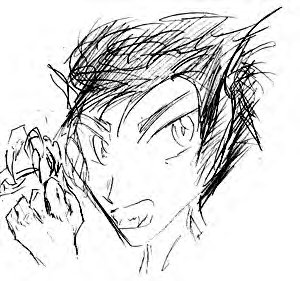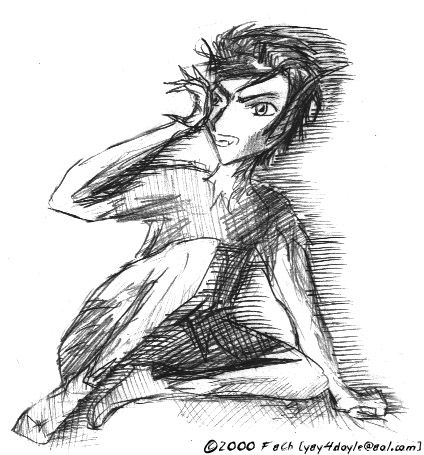

Most Vorta have black hair that is swept up from the ears; brown haired Vorta hail from southernmost Cobinsen. Lavender is the most common eye color, but there are other jewel-toned variants such as gray-violet, lilac, indigo, blue-violet, and amethyst. Ears are ridged and curved, starting close at the jawline to the top of the head. Females have smaller ears than males. To a point, the ears can be pleasure zones.
Vorta are slender, graceful, mostly beautiful, have soft voices, and are playful in nature. It is sometimes a shock to hear a Vorta raise his voice in anger as they are generally so soft-spoken.
Height ranges from 5’3 to 6’0. Not all Vorta are short as Weyoun as goes the popular belief.
The average lifespan is about 180 years; Vorta are fully developed and mature adults at 45--the equivalent of 20 Terran years
Vorta are mostly nocturnal creatures which explains white skin, weak eyes, sharp hearing (they can pick up low whispering from 7 meters away), sharp taste buds except in clones, and high sense of touch.
All Vorta have telepathic and/or empathic abilities to some degree, even if it is close to non-existent. They have the ability to project a blue fireball that can violently throw their enemies backward up to 3 meters as a means of self-defense. Eris, the first Vorta to infiltrate the Federation, had her abilities modified so she could have the ability of disabling a medium-strength forcefield.
Vorta are immune to most poisons. Weyoun 5 once drank a glass of kanar laced with voraxna poison (which has the strength to kill a dozen Cardassians) and suffered no ill effects, even cheerfully remarking that the flavor was "quite toxic."
The number of incarnations does not indicate status; for example, a clone who has come to his 50th incarnation in a short period of time is probably either a very foolish person, or a most disagreeable person who is always giving his enemies a reason to kill him. A clone in a low incarnation level number may indicate that he is either very careful, unusually cooperative, or has a relatively safe profession away from the front lines of battle.
A clone's memories are "downloaded" into his sucessor at the demise of the predecessor; how this procedure is performed remains a secret to persons other than the Vorta and the Founders. Clones routinely backup their memories at the cloning facilities to ensure that no important data is lost. However, memories of defective clones are purged from the memory bank and a new one is activated. Defective clones are considered a threat and are eliminated as quickly as possible by their sucessors.
Clones have an extremely limited sense of taste. They are able to appreciate the textures of different foods, but can only taste foods native to their world such as kava nuts and rippleberries.
A clone's aesthetic sense is either very little to nonexistent as having an appreciation of beauty and arts can be distracting. Clones do retain a sense of beauty toward their own race, and enough aesthetics to maintain proper hygiene.
Clones have a convenient means of committing suicide. They have a device implanted in their brain stem which is activated by placing the right thumb and index finger under the chin and behind the ear, then applying firm pressure. While death is not instantaneous, it is quick, but painful. Vorta who are captured alive and returned to the Dominion are brutally "debriefed," then executed.
The zheshanibra--meaning "ones lost to the darkness"--are a feral Vorta
subrace who inhabit the Aurakal Haunted Forest. Knowledge of their existence was discovered
by a botanist who was collecting plants near the forest and happened upon a corpse of
this strange-looking Vorta in the fields. The unknown Vorta was wearing scant clothing and had a few
unusual personal items; his apparent cause of death was severe mauling by a mricrag panther.
His body was taken to the nearest research lab and extensively examined.
The zheshanibra do not coexist with the normal Vorta
society and seem to abhor all contact with them. A zheshanibra was once successfully captured and
held in captivity. He was studied only for a few weeks before he attacked a scientist
and escaped. What little information was gathered from this species is presented below:
The zheshanibra are fiercely territorial and cannot tolerate normal light; the
eternal darkness of the Aurakal Forest has forced them to evolve sharp nocturnal vision. Their eyes are
an extremely pale lilac color--almost clear--and are larger than a normal Vorta's; they also
have a strange reflectivity like cat eyes. They have sharp nails and teeth, indicating possible carnivores. They are lean, highly agile, and flexible; their long
legs have exceptionally strong tendons and muscles. They are estimated to be only 5'2 in height. Their language consists
of growls and snarls as well as currently indecipherable words. They exhibit no apparent telepathic abilities. They have no advanced
technology and are presumed to have short life spans.
There are many theories presented as to the existence of the
zheshanibra, none confirmed. Why do they perceive themselves to be so different that they cannot even
recognize the similarities between themselves and other Vorta? Was this subrace the result of hundreds of years of complete isolation? Research into this mysterious
subrace is still in the works.
FaCh happened to be exploring in one of the cities near Aurakal Haunted Forest when she heard about the live capture of a zheshanibra. She rushed to the university where the creature was being held and managed to get some sketches of the zhe (as the scientists called it for short). Here are the depictions.


